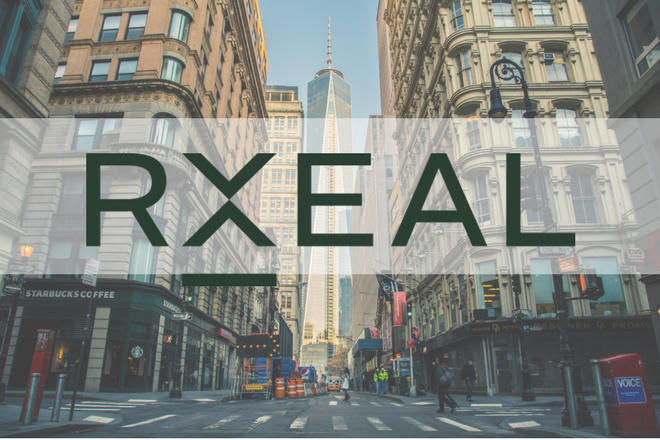We have previously learned How RxEAL is Solving One of the Rental Economy’s Biggest Headaches. In this article, we take a more detailed look at exactly how RxEAL is changing the face of security deposits in the rental market.
Why RxEAL Exists
CEO Dmitrijs Orlovs describes RxEAL’s aims:
RxEAL aims to solve the high rate of security deposit disputes with blockchain technology. We provide a blockchain-based platform on which users can create smart contracts in a simple way. The immutable blockchain-based smart contract technology eliminates the possibility of breaching the contract terms.
Also, security deposits no longer have to be handed over to an unknown lessor, because the funds are securely stored on the Ethereum blockchain. This solution provides equal control over the deposited funds since any changes or withdrawals from the deposit must be mutually approved.
If a disagreement about the deposited funds does arise, on the RxEAL platform, the decentralized blockchain technology is used to directly connect independent legal experts with parties involved in a rental agreement. The legal experts are paid in RXL tokens for resolving disputes. This approach significantly reduces legal costs and time required to solve a dispute.
Why RxEAL is Needed in the Current Rental Economy
Companies like RxEAL is why the world is embracing blockchain. In every industry, there are problems aplenty. And when solutions are found, it’s those that answer some of our most pressing industry-specific problems that enjoys the most time in the limelight, Yet the true value of blockchain comes to light by presenting solutions to those issues we’ve learned to “just deal” with.
Security deposits certainly aren’t the biggest challenge in the real estate market. That is, not until you encounter a problem with yours. Suddenly, what was once a straightforward agreement now becomes a communication crisis, and can easily escalate to a costly legal dispute. The mere prospect of the possibility of such an issue arising is enough to give any lessee – whether you’re renting a property, car, or a piece of equipment – cause for concern.
This is why for lessees, the emergence of RxEAL – with its trustless business model and quick, easy, and cheap dispute process – might just be the solution they’ve been waiting for.
Meanwhile, over and above the desire to avoid disputes (or at least make them less costly or time-consuming), lessors face an additional problem. In some areas, the rental market is fiercely competitive, and it’s difficult to set your offering apart from those of others. Roping in the RxEAL platform as part of a value-added rental offering, marketing and new customer acquisition opportunities abound for lessors.
Who is RxEAL For?
RxEAL is ultimately benefical to both parties taking part in the rental relationship. It bypasses the need for a (fallible) trust relationship by introducing trustlessness as a key factor in managing security deposits. At the same time, should disputes arise – as they sometimes do – the process is facilitated in the quickest and most cost-effective way, eliminating the need for expensive lawyers and lengthy court cases.
Everyone from individual lessors to property developers, real estate management firms, multi-unit or multi-property landlords, and real estate, car, and equipment rental agencies can improve their business processes and service offerings by joining the RxEAL platform.
Which Lessor Problems Do RxEAL Solve?
While it’s easy to understand why a lessee would want to make use of the RxEAL solution, the service is just as crucial for lessors to ease the security deposit pain points they experience in the course of doing business. We look at each of these in turn, and how RxEAL is providing a welcome alternative to the current model.
- Tracking Funds: Security deposits become almost impossible to track and validate in a court of law. In many jurisdictions, commingling of funds can forfeit a landlord’s right to claim any of the deposit.
- Interest Accrual: Many jurisdictions require that a landlord collect interest on behalf of the tenant. This becomes nearly impossible to calculate if the deposit is commingled with personal funds.
The Current Solution is Cumbersome
To avoid commingling funds, improve record-keeping, and meet interest accrual requirements, the property owner has to open separate rental operating accounts and security deposit accounts for each tenant. This, naturally, is both time-consuming and costly, not to mention a logistical headache.
The RxEal Solution
With RxEal, each tenant’s security deposit is held in a dedicated smart contract, preventing commingling of funds. Deposits can be tracked independently, making bookkeeping a breeze. Each smart contract can accrue its own interest as per jurisdictional requirements and the preferences of the lessor or lessee.
The RxEAL Process
One of the best things about the current state of blockchain development and growth is the time and commitment going into making the technology accessible, without the requirement of technical know-how on the part of the end-user. Similarly, RxEAL users require no prior knowledge of blockchain technology or smart contracts.
The platform is positioned as a software service much like any other, making it easy for users to jump aboard and make security deposit management quick and effective. In cases where lessors are not in possession of a required Ethereum wallet, RxEAL will guide them through the creation process.
Once in possession of such a wallet, lessors fill out predefined forms in order to draw up a smart contract draft in accordance with previously agreed-upon terms between the two parties. Once the lessee has reviewed and accepted this draft, the lessor pays the required platform and deployment fees (payable in RXL tokens and ether, or another compatible cryptocurrency), and the smart contract is a go. In order to foster platform adoption, RxEAL will assist lessors with buying RXL tokens, should they not as yet be cryptocurrency-proficient.
At the end of the official contract, or when both parties agree to a termination, lessors are able – when applicable – to subtract funds from the deposit, damages-dependent, but only in full agreement with the lessee. If no such need exists, the deposit is returned based on the initially agreed-upon terms.
Should a dispute be necessary, the RxEAL legal team will provide a template so that both parties can provide the information required to resolve the dispute quickly and cost-effectively.
Three verified, independent arbitrator will be randomly assigned to review the case. A decision is finalized based on the majority vote. Arbitrators are selected based on the outcome of an online qualifying test. In future, RxEAL plans to launch an AI-powered layer designed to intelligently assign arbitrators to a case so as to minimize bias and unfair rulings.
The process is highlighted below.
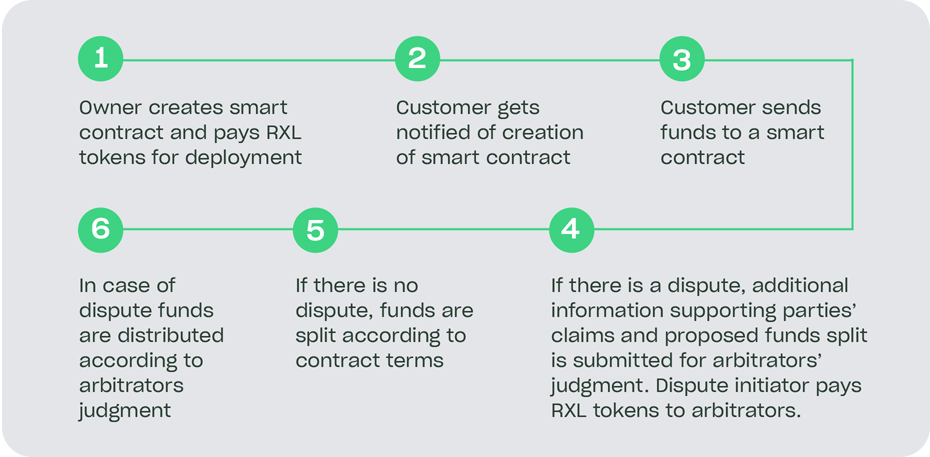
How Secure Will Deposits Be?
In an industry where hacks are big news, security is on everyone’s lips. The RxEAL platform token, RXL, is ERC-20 standard, and the technology itself is built on the Ethereum network.
RxEAL is a smart contracts provider and not a bank account; the company does not store deposits, nor do they have access to deposit funds kept in smart contracts. This makes hacking the RxEAL platform for access to the funds a dead-end.
At the same time, personally identifiable information will be stored off-chain, inaccessible by the public, while non-personally identifiable information such as contract duration, deposit amount, and public wallet addresses will be accessible publicly as per the nature of smart contracts.
Other security measures currently operational or to be implemented in future are:
- HTTPS with SSL
- Password and username encryption
- 2-step verification
- WAF (web application firewall)
- SQL injection protection
- Data offline storage
The RxEAL Roadmap
Thus far, the platform’s product concept, along with their user interface, brand and identity, has been presented to industry experts in the US, UK, Europe and Asia, with RxEAL receiving analysis and feedback on their project.
The roadmap will closely follow the following proposed timelines.
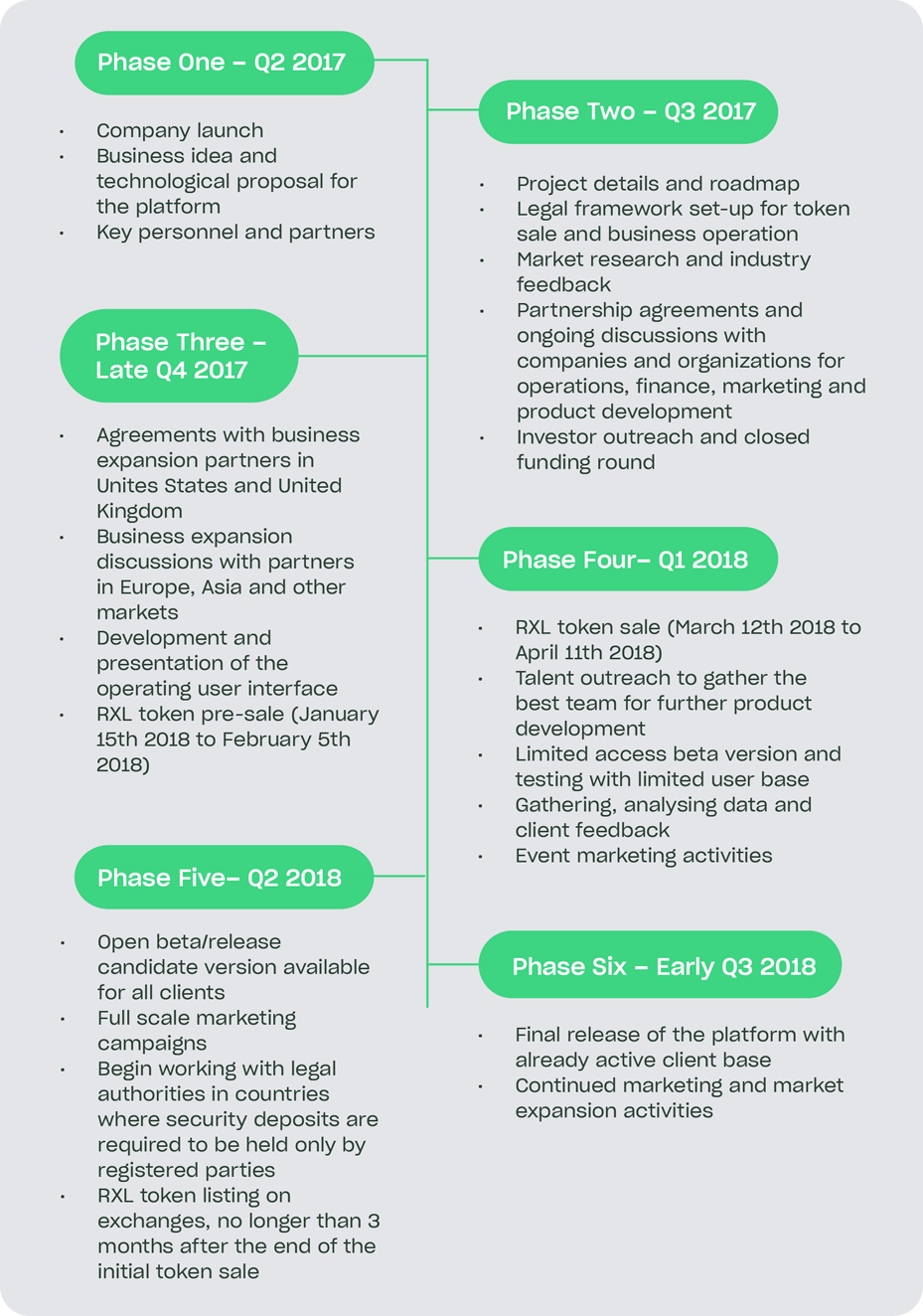
RxEAL’s Token Economics
As an ERC-20 standard-compliant token, RXL rests on the shoulders of Ethereum’s trusted technology. As a utility token, it bypasses financial speculation to serve as a key component of the financial and transactional process when using the RxEAL platform.
Initially, RXL will be valued at 1,200 RXL per 1 ETH. The token price will increase as the platform itself gains traction, as RXL’s fixed token supply will appreciate in value due to increased usage of the RxEAL platform. This, in turn, will lead to good investment gains. Initial market capitalization will be calculated using circulating supply alone, as opposed to the total supply, disregarding unsold or reserved tokens.
Based on an assumption of a daily transaction count based on an average deposit worth US$500, the following token demand is projected based on initial price.
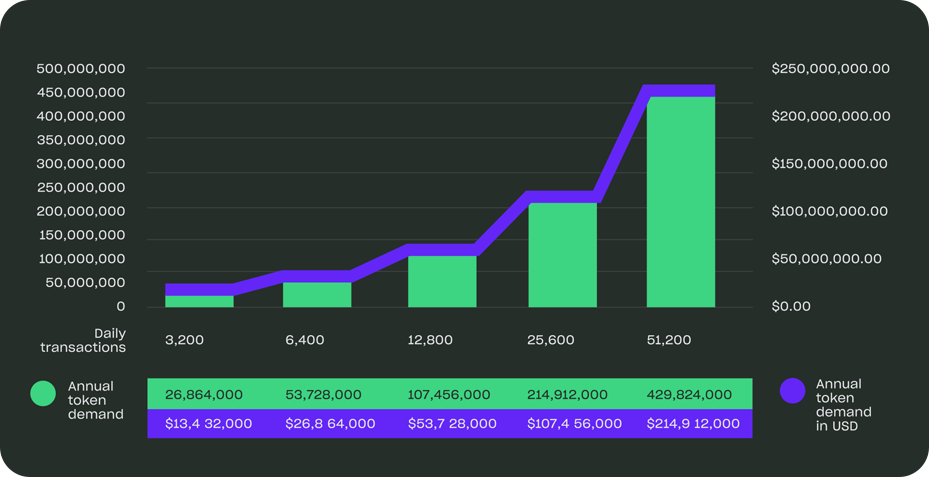
The RxEAL ICO
The RxEAL ICO commences today on March 12, 2018.
The numbers powering the company’s token sale are:
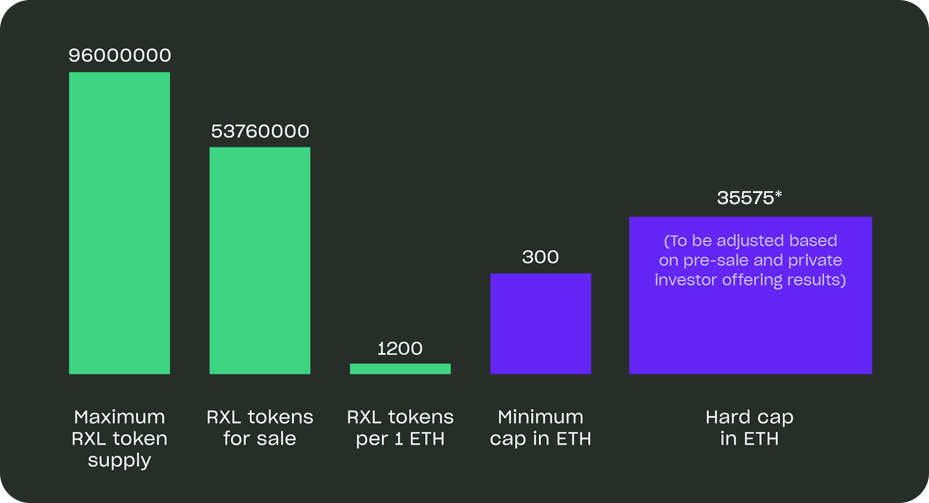
Applicable bonuses during each stage of the ICO are as follows:
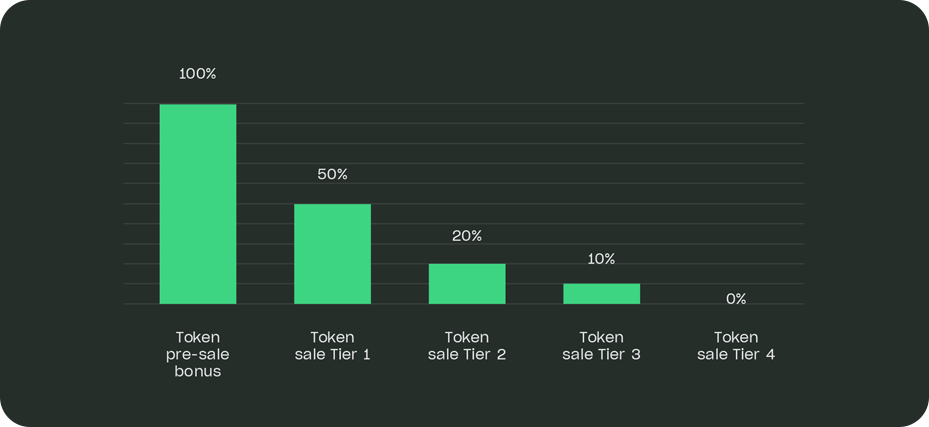
The following chart explains the tiered approach in more detail:
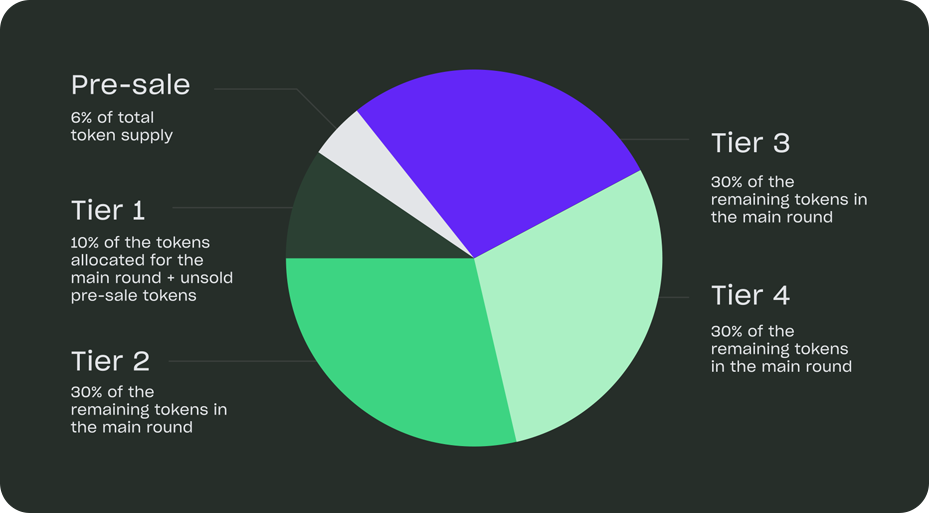
After the conclusion of the token sale, tokens will be allocated in the following manner:

Additionally, funds raised will be allocated thusly:
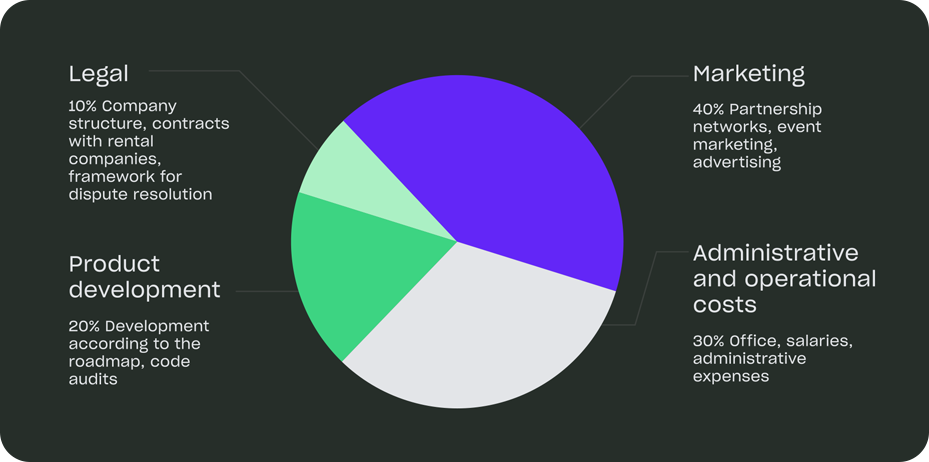
To learn more and participate in the ICO, read the RxEAL whitepaper and sign up for an account. Their Telegram group can answer any questions you may have about the project and token sale.

